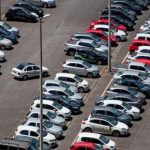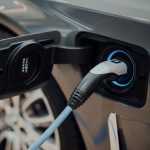Matt Boyd, Founder, JDM IKIGAI
If you had approached me a decade ago and told me that, in the future, electric cars would make life so easy and convenient that you could eat a bowl of cereal or do a full face of makeup while on the way to your destination, I would have had more faith in South Africa’s ability to end load-shedding. I would have had the same thought if you told me that one day I would find electric cars highly appealing and maybe even want to own one.
10 years ago, at the ripe and reckless age of 18, I drove a 1997 1.4-litre Opel Corsa Lite, which I had turbocharged (really believing it was the fastest thing in the country). I would drag race it at Killarney International Raceway in Cape Town and on the streets whenever I got the chance. It had ridiculous modifications that were horrible to use in traffic, and I daily drove the car like it had nine lives. That car taught me many lessons, the biggest one being the inconvenience of driving modified, uncomfortable cars every day.
Around the same time, South Africa had just begun to implement the nightmare that is load-shedding into our society. It was caused by a depletion of coal, leading to power cuts of 2-4 hours a day for 2 to 3 days a week.
This was the exact issue electric cars were born to prevent: preserving resources and saving the integrity and well-being of our environment. At this time, however, electric cars were expensive and not easy to come by. Tesla had just broken the 200-mile range with their Roadster model, but that came with a hefty price tag for a tiny car that couldn’t actually go very far. Honestly, it was not seen as desirable by the average consumer.
Fast forward 5 years, and South Africa had just moved to stage 4 load-shedding, meaning we averaged about 4 hours without power per day. This didn’t give much hope for the new Tesla Model 3, the Chevy Bolt, or the Nissan Leaf, the most popular electric vehicles (EV’s) at the time, to be valid options for South Africans. Those options also didn’t scream excitement for the average driver, let alone for a car enthusiast. Especially considering the average price of an EV in 2019 was around R1.2 million.
Today, the electric market offers a different perspective for a car enthusiast like myself and presents an appeal that is nearly impossible to ignore for the average person: It looks cool, has incredible features, and saves you money! Load-shedding and power outages in Africa is, on the other hand, far worse than ever, and much of our continent is currently looking for off grid solutions. What does that mean for enthusiasts in Africa wanting to buy into the convenience and fun the EV market now offers globally?
Surprisingly, the theoretical access to charging your EV wouldn’t be the biggest problem. At least South Africa, for the most part, has been outfitted with the necessary charging infrastructure in major cities and populated areas, and the access we do get to electricity is usually sufficient to obtain enough charge for daily living. The problem facing the average enthusiast in Africa is actually access to the vehicles.
The international electric market in 2024 is flooded with plenty of fun, enticing options for everyone. Whether you’re looking for something fast and fun, big and spacious, or even something capable off-road, it’s out there and available. However, in most African countries the tax on importing these babies is much higher than tax on importing a normal car, leading to our auto market only allowing for some not-so-exciting electric vehicles to be affordable (such as the bland BYDs we see supplied by most suppliers). In South Africa alone there is a 25% levy on import tax on EVs, compared to 18% for normal vehicles.
The electric vehicles that are fun or interesting fall into price brackets so high that it makes more sense to buy the upgraded original variants that actually take petrol or diesel. So unless you’re a rich environmentalist on a crusade to reduce your carbon footprint, buying an electric vehicle in Africa overall just doesn’t make sense.
There are some countries, however, that are starting to get it right. Ethiopia has recently declared that electric vehicles are exempted from VAT, excise, and surtaxes. The only tax they pay is for import taxes, which sit at 15% (not great, but it’s a start!).
By reflecting on the past decade, we can see that the evolution of electric cars has gone from an impractical and expensive notion to a highly appealing and convenient choice.
However, for enthusiasts in Africa, there are 2 main obstacles that stand between us and automotive innovation: Firstly, would it be worthwhile to readjust the tax on these EV’s in order to bring them into the newly found market? And secondly, if we did bring them in, would they work in an economy where we have to fight for electricity to operate them? I guess time will tell.
 We just launched our WhatsApp channel. Want to get the latest news from the Tech in Africa?
We just launched our WhatsApp channel. Want to get the latest news from the Tech in Africa?



